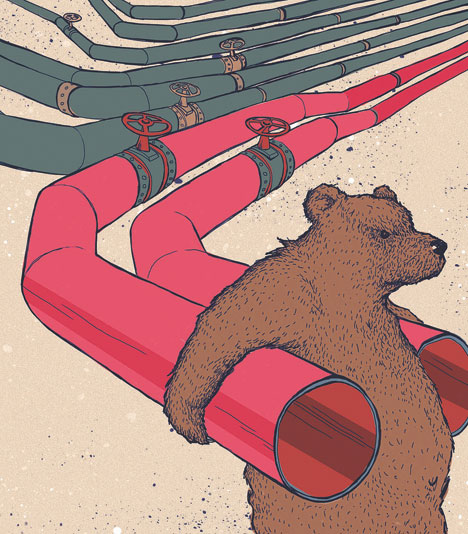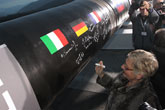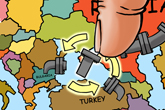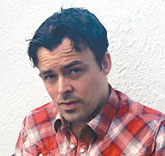South Stream cancellation opens new front in gas war
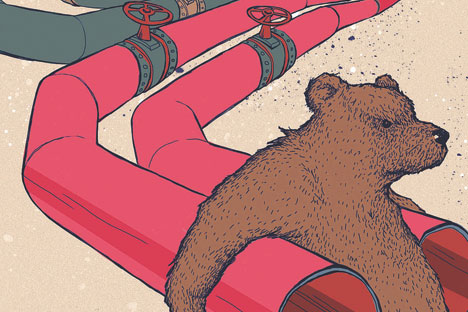
Click to enlarge the image. Drawing by Natalia Mikhaylenko
President Vladimir Putin announced early December that the South Stream gas pipeline would no longer run to south-eastern Europe. Since then, the reasons for the Russian about-turn have been discussed all over the comment pages. However, what all the commentators have missed is one salient fact – if the pipeline was going to Germany, or another major European Union country, the outcome would almost certainly have been different.
It seems that there is one set of rules for Germany and France and another set of rules for others in the 28-member union. It’s a classic case of: “Do as I say, not as I do”. This time, though, the European giants may have managed to shoot themselves in the foot.
In 2004, the “EU constitution” was signed in Rome. The treaty would have massively expanded the power of Brussels and was controversial from the beginning. French voters thought they had put paid to it a year later when they rejected it in a referendum, though many other members had already signalled their assent.
Fly in the ointment
Brussels Eurocrats had another go with the German-driven Lisbon Treaty in 2007, this time without any plebiscites. There was one fly in the ointment: Ireland’s laws demanded a referendum to implement it. Ireland voted no.
Was the idea scrapped? Of course not. The Irish public was forced to vote again until the big powers in Brussels got the result they actually wanted.
The lesson was simple. France is big and important, so its opinion matters; Ireland is small and peripheral, so the concerns of its citizens (and politicians) matter less.
Something similar has happened in recent months to some European Union members in eastern Europe as the vital South Stream pipeline was cast to the wind, apparently largely because of Brussels-imposed obstacles. The weak have been ordered to “take one for the team” while the powerful are unaffected.
If South Stream had been going to France or Germany, it would have been built – just like the northern pipeline, Nord Stream. Completed in 2012 Nord Stream basically secures Berlin’s energy needs. If the southern route, through the Black Sea to Bulgaria and through Serbia, Hungary and Slovenia to Austria, had been built before then, would Angela Merkel have abandoned Nord Stream? Pigs might fly.
When Mr Putin announced last week that South Stream was a non-runner and that Russia had an alternative plan to initiate a pipeline to Turkey, the blame game began.
It’s obvious that the big winner is Ankara and that, for now at least, Moscow feels that it can take or leave the Balkans. The largest losers are Bulgaria and Serbia, which would have guaranteed their gas supplies and pocketed significant transit fees.
Hungary, Slovakia and Austria are consigned to the mercy of shifting political winds in Ukraine, which remains the transit point. That could make them stakeholders in guaranteeing Ukraine’s viability as a stable state, but it’s equally valid to speculate that this matter is almost entirely out of their hands anyway.
Last week’s events are either the latest or the final step in a never-ending EU-Gazprom conflict. It looks as if Berlin has ensured its own supply before feeling confident enough to use events in Ukraine this year as an excuse to wind up the feud.
Mumbo jumbo
Brussels resents being beholden to Gazprom because it’s a monopoly and one it doesn’t control. Its latest ploy is the Third Energy Package, a barely concealed attempt to undermine Gazprom disguised in the mumbo jumbo of “competition laws”. It is the same sort of approach that is stringently enforced – in other industries – in Slovenia and Estonia, but widely ignored in France and Germany.
Eurocrats understand they depend on Russian gas but want European companies operating in Russia to deliver it, without any Russian state company dictating terms. The Kremlin has said nyet and Europe has been wrong-footed.
Brussels apparatchiks insist on believing that Moscow needs Europe more than they need Moscow. Mr Putin might have sucker-punched them with his unanticipated pivot to Turkey, but was it a knockout blow? Some Europeans think Mr Putin is bluffing. But the Kremlin chief is a judo master, not a poker player. It looks like EU officials have fallen for their own fantasies. Don’t be fooled; the Kremlin appears to be deadly serious.
Diplomatic genius
Call it diplomatic genius, but Mr Putin has also managed to further drag Turkey out of the western orbit and checkmated the EU on a much-speculated alternative supply route from Qatar. This hypothetical route would have gone through Turkey, which now no longer needs it.
The move has opened up a new front in geopolitics. Turkey, which appears to have given up on any hope of being accepted into the EU, is pulled towards Eurasia. The West’s Syrian “regime change”programme – a continuing nightmare for Ankara and Moscow – is weakened. Meanwhile, central and south-eastern Europe is hung out to dry.
The Russia-Turkey energy deal is more than a simple gas trade: it has the potential to change a multitude of geopolitical certainties. The “battle” between the West and Eurasia might just have intensified.
Bryan MacDonald is an Irish journalist who focuses on Russia and international geopolitics.
All rights reserved by Rossiyskaya Gazeta.
Subscribe
to our newsletter!
Get the week's best stories straight to your inbox
